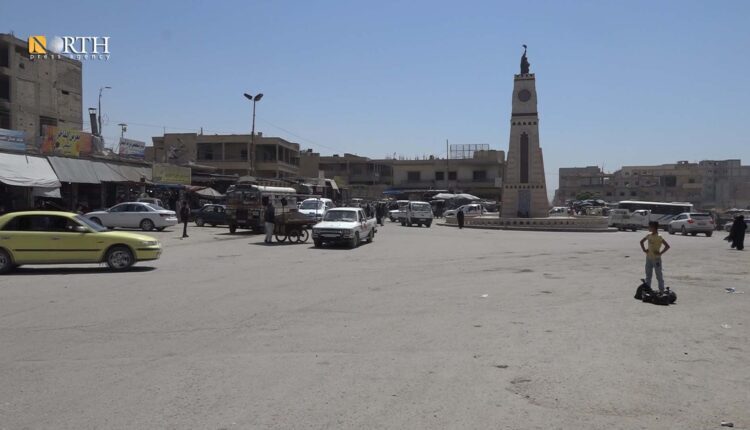RAQQA, Syria (North Press) – Residents of the city of Raqqa in northern Syria, are afraid of Syrian government forces entry into the areas of the Autonomous Administration of North and East Syria (AANES), also known as Rojava, as well as the return of the security forces.
This came following reports regarding the possible return of the government forces along with their security apparatuses to the AANES-held areas.
Mamdouh al-Ali, 20, a resident of Raqqa, said that most of the residents refuse the government’s entry, especially the security forces, which, if it happens, will commit “violations” in the area.
The entry of the government forces means “committing massacres, violations and arrests against civilians, and we categorically refuse this,” al-Ali added.
He told North Press that the residents “want to remain under the rule of the AANES until a political solution is reached in Syria that brings the war to an end.”
Al-Ali pointed out that most Syrians saw how the government forces committed “arrests and violations against people, especially the youth in the areas they entered.”
The government forces left Raqqa in March 2013, after an attack by Syrian opposition and extremist factions on the city, which ended with the announcement of complete control over it by those factions.
Despite the multiple parties that controlled Raqqa, starting with the opposition factions and then Hay’at Tahrir al-Sham (formerly al-Nusra Front), and after that the Islamic State (ISIS), to be liberated later by the Syrian Democratic Forces (SDF), this did not prevent the city from turning into a magnet for people wanted by the Syrian government and its security forces.
According to the residents, the city today “contains thousands of wanted persons by the Syrian government’s security forces, including dissident members, former employees, those who have not accomplished the compulsory service, civil activists and opposition politicians.”
Nadima Mustafa, a resident of Raqqa, said that the Syrians refuse to talk about reconciliation between the opposition and the Syrian government under Turkish auspices, after statements made in this regard by Turkish officials.
On August 18, Turkish Minister of Foreign Affairs Mevlut Cavusoglu told reporters in the 13th Ambassadors Conference in Ankara about Turkish efforts to reconcile between the Syrian government and the opposition, which angered activists, who called for a demonstration against the statements.
“We have to somehow bring opposition and the regime in Syria together to reach an agreement. Otherwise, there will be no lasting peace,” he said.
“We have a real fear of the possibility of government forces entering the cities and regions of northeastern Syria, and at the same time we say publicly that we refuse this to happen.” She added
She pointed out, in an interview with North Press, that the concern about the entry of government forces “is an obsession that disturbs the comfort of society, especially young men who have lost hope with the war continuity that the country has been suffering from for more than a decade.”
The Syrian government forces returned to the countryside of the northern city of Raqqa after understandings with the (SDF) late 2019, to stop the progress of the Turkish army and Turkish-baked opposition factions also known as the Syrian National Army (SNA).
Officials of the AANES stress that the mission of the government forces that entered northeast Syria is only to protect the borders, stressing that they are prevented from entering cities and interacting with residents.
Sa’eed al-Sarraj, a civilian activist from Raqqa, said that the residents do not show any refusal to the understandings between the SDF and the Syrian government regarding protecting borders from the Turkish incursion and attacks on northern Syria.
The security forces entry, however, accompanied by Iranian-backed militias to the villages and cities of northeast Syria “is a rejected proposal by all the residents,” according to al-Sarraj.
He considered that the Syrian government forces do not hesitate to return to the policy of residents “repression, arrest, and abuse” after establishing themselves in the area and ensuring their control over it.
He stated that the association of the Iranian-backed militias with the Syrian forces and joint fight “increase a concern factor, especially the Syrians’ certainty of the scale and atrocity of the crimes committed by these militias against the Syrian people.”

